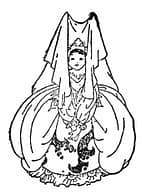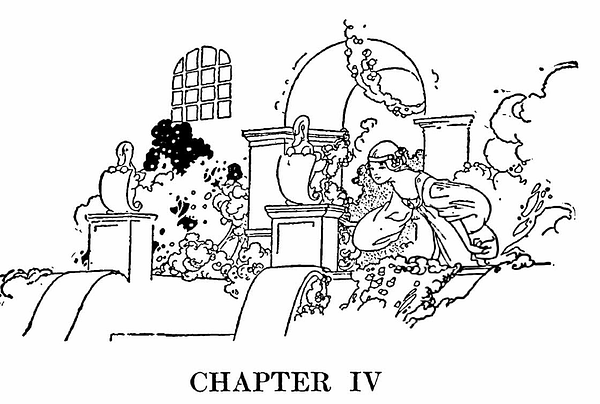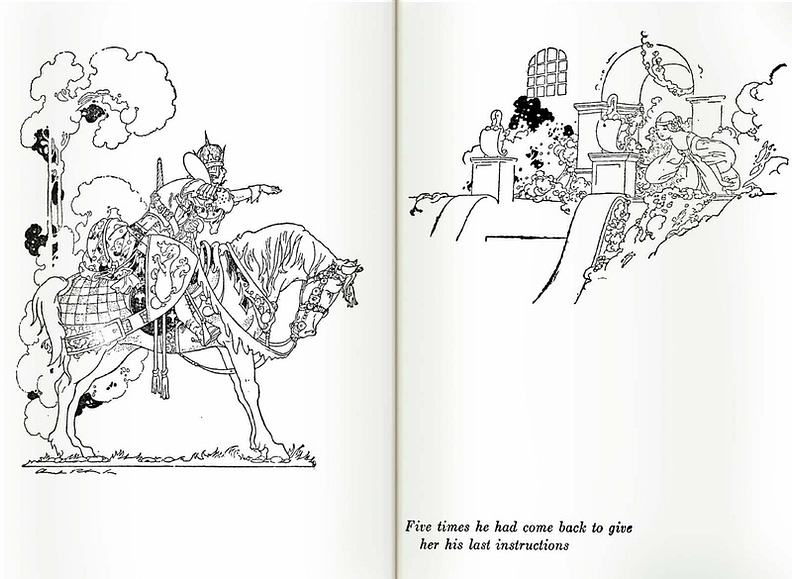It is now time to introduce Wiggs to you, and I find myself in a difficulty at once. What was Wiggs’s position in the Palace?
This story is hard to tell, for I have to piece it together from the narratives of others, and to supply any gaps in their stories from my knowledge of how the different characters might be expected to act. Perhaps, therefore, it is a good moment in which to introduce to you the authorities upon whom I rely.
First and foremost, of course, comes Roger Scurvilegs. His monumental work, Euralia Past and Present, in seventeen volumes, towers upon my desk as I write. By the merest chance I picked it up (in a metaphorical sense) at that little shop near—I forget its name, but it’s the third bookshop on the left as you come into London from the New Barnet end. Upon him I depend for the broad lines of my story, and I have already indicated my opinion of the value of his work.
Secondly, come the many legends and ballads handed on to me years ago by my aunt by marriage, one of the Cornish Smallnoses. She claims to be a direct descendant of that Henry Smallnose whose lucky shot brought about the events which I am to describe. I say she claims to be, and one cannot doubt a lady’s word in these matters; certainly she used to speak about Henry with that mixture of pride and extreme familiarity which comes best from a relation. In all matters not touching Henry, I feel that I can rely upon her; in its main lines her narrative is strictly confirmed by Scurvilegs, and she brought to it a picturesqueness and an appreciation of the true character of Belvane which is lacking in the other; but her attitude towards Henry Smallnose was absurd. Indeed she would have had him the hero of the story. This makes Roger and myself smile. We give him credit for the first shot, and then we drop him.
Thirdly, Belvane herself. Women like Belvane never die, and I met her (or a reincarnation of her) at a country house in Shropshire last summer. I forget what she calls herself now, but I recognised her at once; and, as I watched her, the centuries rolled away and she and I were in Euralia, that pleasant country, together. “Stayed to tea and was very charming.” Would she have said that of me, I wonder? But I’m getting sentimental—Roger’s great fault.
These then are my authorities; I consult them, and I ask myself, What was Wiggs?
Roger speaks of her simply as an attendant upon the Princess. Now we know that the Princess was seventeen; Wiggs then would be about the same age—a lady-in-waiting—perhaps even a little older. Why not? you say. The Lady Wiggs, maid-of-honour to her Royal Highness the Princess Hyacinth, eighteen and a bit, tall and stately. Since she is to endanger Belvane’s plans, let her be something of a match for the wicked woman.
Yes, but you would never talk like that if you had heard one of my aunt’s stories. Nor if you had seen Belvane would you think that any grown-up woman could be a match for her.
Wiggs was a child; I feel it in my bones. In all the legends and ballads handed down to me by my aunt she appears to me as a little girl—Alice in a fairy story. Roger or no Roger I must have her a child.
And even Roger cannot keep up the farce that she is a real lady-in-waiting. In one place he tells us that she dusts the throne of the Princess; can you see her ladyship, eighteen last February, doing that? At other times he allows her to take orders from the Countess; I ask you to imagine a maid-of-honour taking orders from any but her own mistress. Conceive her dignity!
A little friend, then, of Hyacinth’s, let us say; ready to do anything for anybody who loved, or appeared to love, her mistress.
The King had departed for the wars. His magic sword girded to his side, his cloak of darkness, not worn but rolled up behind him, lest the absence of his usual extensive shadow should disturb his horse, he rode at the head of his men to meet the enemy. Hyacinth had seen him off from the Palace steps. Five times he had come back to give her his last instructions, and a sixth time for his sword, but now he was gone, and she was alone on the castle walls with Wiggs.
“Saying good-bye to fathers is very tiring,” said Hyacinth. “I do hope he’ll be all right. Wiggs, although we oughtn’t to mention it to anybody, and although he’s only just gone, we do think it will be rather fun being Queen, don’t we?”
“It must be lovely,” said Wiggs, gazing at her with large eyes. “Can you really do whatever you like now?”
Hyacinth nodded.
“I always did whatever I liked,” she said, “But now I really can do it.”
“Could you cut anybody’s head off?”
“Easily,” said the Princess confidently.
“I should hate to cut anybody’s head off.”
“So should I, Wiggs. Let’s decide to have no heads off just at present—till we’re more used to it.”
Wiggs still kept her eyes fixed upon the Princess.
“Which is stronger,” she asked, “you or a Fairy?”
“I knew you were going to ask something horrid like that,” said Hyacinth, pretending to be angry. She looked quickly round to see that nobody was listening, and then whispered in Wiggs’s ear, “I am.”
“O—oh!” said Wiggs. “How lovely!”
“Isn’t it? Did you ever hear the story of Father and the Fairy?”
“His Majesty?”
“His Majesty the King of Euralia. It happened in the forest one day just after he became King.”
Did you ever hear the story? I expect not. Well, then, you must hear it. But there will be too many inverted commas in it if I let Hyacinth tell you, so I shall tell you myself.
It was just after he became King. He was so proud that he used to go about saying, “I am the King. I am the King.” And sometimes, “The King am I. The King I am.” He was saying this one day in the forest when a Fairy overheard him. So she appeared in front of him and said, “I believe you are the King?”
“I am the King,” said Merriwig. “I am the King, I am the——”
“And yet,” said the Fairy, “what is a King after all?”
“It is a very powerful thing to be a King,” said Merriwig proudly.
“Supposing I were to turn you into a—a small sheep. Then where would you be?”
The King thought anxiously for a moment.
“I should like to be a small sheep,” he said.
The Fairy waved her wand.
“Then you can be one,” she said, “until you own that a Fairy is much more powerful than a King.”
So all at once he was a small sheep.
“Well?” said the Fairy.
“Well?” said the King.
“Which is more powerful, a King or a Fairy?”
“A King,” said Merriwig. “Besides being more woolly,” he added.
There was silence for a little. Merriwig began to eat some grass.
“I don’t think much of Fairies,” he said with his mouth full. “I don’t think they’re very powerful.”
The Fairy looked at him angrily.
“They can’t make you say things you don’t want to say,” he explained.
The Fairy stamped her foot.
“Be a toad,” she said, waving her wand. “A nasty, horrid, crawling toad.”
“I’ve always wanted—” began Merriwig—”to be a toad,” he ended from lower down.
“Well?” said the Fairy.
“I don’t think much of Fairies,” said the King. “I don’t think they’re very powerful.” He waited for the Fairy to look at him, but she pretended to be thinking of something else. After waiting a minute or two, he added, “They can’t make you say things you don’t want to say.”
The Fairy stamped her foot still more angrily, and moved her wand a third time.
“Be silent!” she commanded. “And stay silent for ever!”
There was no sound in the forest. The Fairy looked at the blue sky through the green roof above her; she looked through the tall trunks of the trees to the King’s castle beyond; her eyes fell upon the little glade on her left, upon the mossy bank on her right . . . but she would not look down to the toad at her feet.
No, she wouldn’t. . . .
She wouldn’t. . . .
And yet——
It was too much for her. She could resist no longer. She looked at the nasty, horrid, crawling toad, the dumb toad at her feet that was once a King.
And, catching her eye, the toad—winked.
Some winks are more expressive than others. The Fairy knew quite well what this one meant. It meant:
“I don’t think much of Fairies. I don’t think they’re very powerful. They can’t make you say things you don’t want to say.”
The Fairy waved her wand in disgust.
“Oh, be a King again,” she said impatiently, and vanished.
*****
And so that is the story of how the King of Euralia met the Fairy in the forest. Roger Scurvilegs tells it well—indeed, almost as well as I do—but he burdens it with a moral. You must think it out for yourself; I shall not give it to you.
Wiggs didn’t bother about the moral. Her elbows on her knees, her chin resting on her hands, she gazed at the forest and imagined the scene to herself.
“How wonderful to be a King like that!” she thought.
“That was a long time ago,” explained Hyacinth. “Father must have been rather lovely in those days,” she added.
“It was a very bad Fairy,” said Wiggs.
“It was a very stupid one. I wouldn’t have given in to Father like that.”
“But there are good Fairies, aren’t there? I met one once.”
“You, child? Where?”
I don’t know if it would have made any difference to Euralian history if Wiggs had been allowed to tell about her Fairy then; as it was, she didn’t tell the story till later on, when Belvane happened to be near. I regret to say that Belvane listened. It was the sort of story that always got overheard, she explained afterwards, as if that were any excuse. On this occasion she was just too early to overhear, but in time to prevent the story being told without her.
“The Countess Belvane,” said an attendant, and her ladyship made a superb entry.
“Good morning, Countess,” said Hyacinth.
“Good morning, your Royal Highness. Ah, Wiggs, sweet child,” she added carelessly, putting out a hand to pat the sweet child’s head, but missing it.
“Wiggs was just telling me a story,” said the Princess.
“Sweet child,” said Belvane, feeling vaguely for her with the other hand. “Could I interrupt the story with a little business, your Royal Highness?”
At a nod from the Princess, Wiggs withdrew.
“Well?” said Hyacinth nervously.
Belvane had always a curious effect on the Princess when they were alone together. There was something about her large manner which made Hyacinth feel like a schoolgirl who has been behaving badly: alarmed and apologetic. I feel like this myself when I have an interview with my publishers, and Roger Scurvilegs (upon the same subject) drags in a certain uncle of his before whom (so he says) he always appears at his worst. It is a common experience.
“Just one or two little schemes to submit to your Majesty,” said the Countess. “How silly of me—I mean, your Royal Highness. Of course your Royal Highness may not like them at all, but in case your Royal Highness did, I just—well, I just wrote them out.”
She unfolded, one by one, a series of ornamental parchments.
“They are beautifully written,” said the Princess.
Belvane blushed at the compliment. She had a passion for coloured inks and rulers. In her diary the day of the week was always underlined in red, the important words in the day’s doings being frequently picked out in gold. On taking up the diary you saw at once that you were in the presence of somebody.
The first parchment was headed:
SCHEME FOR ECONOMY IN REALM
“Economy” caught the eye in pale pink. The next parchment was headed:
SCHEME FOR SAFETY OF REALM
“Safety” clamoured to you in blue.
The third parchment was headed:
SCHEME FOR ENCOURAGEMENT OF LITERATURE IN REALM
“Encouragement of Literature” had got rather cramped in the small quarters available for it. A heading, Belvane felt, should be in one line; she had started in letters too big for it, and the fact that the green ink was giving out made it impossible to start afresh.
There were ten parchments altogether.
By the end of the third one, the Princess began to feel uncomfortable.
By the end of the fifth one she knew that it was a mistake her ever having come into the Royal Family at all.
By the end of the seventh she decided that if the Countess would forgive her this time she would never be naughty again.
By the end of the ninth one she was just going to cry.
The tenth one was in a very loud orange and was headed:
SCHEME FOR ASSISTING CALISTHENICS IN REALM
“Yes,” said the Princess faintly; “I think it would be a good idea.”

“I thought if your Royal Highness approved,” said Belvane, “we might just——”
Hyacinth felt herself blushing guiltily—she couldn’t think why.
“I leave it to you, Countess,” she murmured. “I am sure you know best.”
It was a remark which she would never have made to her Father.

